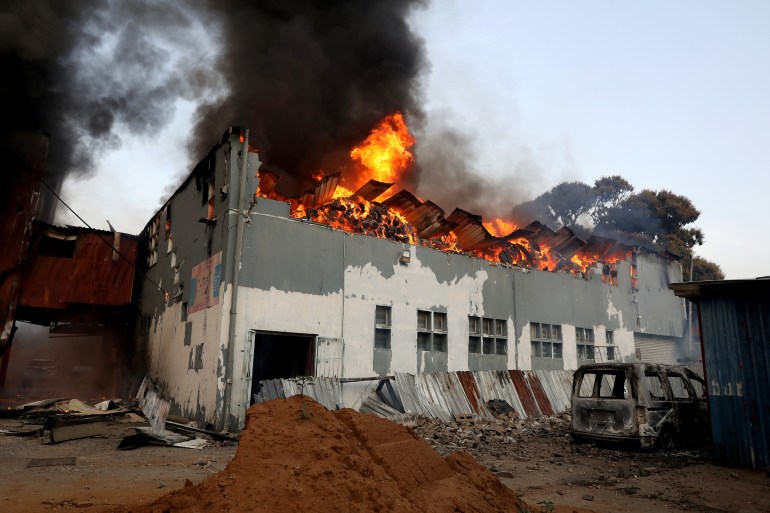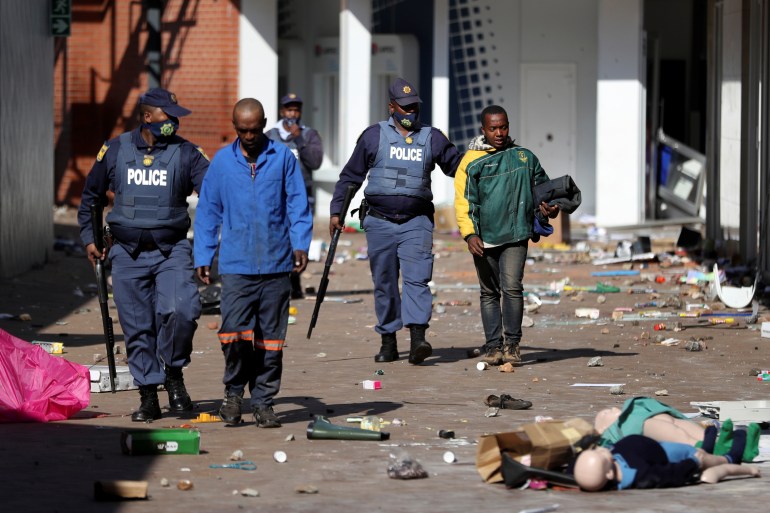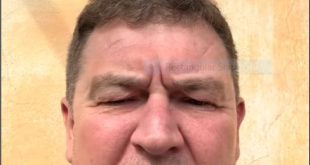More than 70 people killed and 1,000 arrested over five days as authorities fail to stop spiralling violence and looting.
Violence and looting has raged in South Africa for the sixth day running, stoking fears of food and fuel shortages as disruption to farming, manufacturing and oil refining began to bite amid the country’s worst unrest in decades.
More than 70 people have died as grievances over the jailing of former President Jacob Zuma have widened into an outpouring of anger over the inequality that remains 27 years after the end of apartheid.
Poverty has been exacerbated by severe social and economic restrictions aimed at curbing the spread of COVID-19.
More than 1,200 people have been arrested in the lawlessness that has raged in poor areas of two provinces, where a community radio station was ransacked and forced off the air on Tuesday and some COVID-19 vaccination centres were closed, disrupting urgently needed inoculations.
Many of the deaths in Gauteng and KwaZulu-Natal provinces occurred in chaotic stampedes as thousands of people stole food, electric appliances, liquor and clothing from stores, police said.
The deployment of 2,500 soldiers to support the overwhelmed South African police has so far failed to stop the rampant looting.
Here are the latest updates:
South Africa looking into deploying more military to quell unrest, president says
The South African government is looking into expanding the deployment of the military after days of looting and violence, President Cyril Ramaphosa said, according to a statement from his office.
Ramaphosa made the comments during consultations with the leaders of political parties on ways to address the ongoing unrest. The leaders urged him to put more troops on the streets.
“President Ramaphosa welcomed proposals made by political leaders and said expanded deployment of the South African National Defence Force was being addressed,” the statement said.
Residents defend shopping mall from looters
Residents of Pimville town, in the Soweto district area, have gathered to prevent Maponya Mall to be looted, according to local media.
The structure is the only mall in the area that has not been pillaged so far.
Deputy Minister of State Security Zizi Kodwa thanked the community for defending the mall.
Pimville residents have joined forces to protect Maponya Mall in Soweto. Maponya is the only mall in Soweto that hasn’t been looted.
🎥: Nokuthula Mbatha/ African News Agency
Read more here: https://t.co/fgbExyBgWO#SouthAfricaIsBurning #looting #unrestsa pic.twitter.com/2LZnSGHkSl— IOL News (@IOL) July 14, 2021
Mapping arrests and deaths in South Africa’s unrest

South African ports, key rail line disrupted
Major South African ports Durban and Richards Bay and a rail line connecting Durban with the Gauteng province where Johannesburg is located have been disrupted, according to state logistics group Transnet.
Transnet said in a statement that force majeure had been declared on the NATCOR rail line. It added that it was deploying all available resources to avert commercial fuel operations being affected, after being served with a force majeure notice by the SAPREF refinery.
Fears grow over food shortages
As violence continues, looting has hit supply chains and transport links in the Johannesburg region and the southeastern province of KwaZulu-Natal, sending a shockwave to the delivery of goods and services around the country.
Outside a branch of a popular supermarket in northern Durban’s Eastman region, around 400 people started lining up to buy food, hours before the shop was due to open.
“With [this looting], it’s an inflection point … this has now seriously compromised our energy security and food security,” Bonang Mohale, chancellor of the University of the Free State and a professor of business and economics studies, told AFP news agency.
Christo van der Rheede, executive director of the largest farmers’ organisation, AgriSA, said producers were struggling to get their crops to market because the logistical network was in a “shambles”.
“We need the restoration of law and order as soon as possible, because we are going to have a massive humanitarian crisis,” van der Rheede told AFP.
 In the port city of Durban, people started queuing outside food stores and at fuel stations as early as 4am (0200 GMT) when the Covid night curfew ends [Rajesh Jantilal/AFP]
In the port city of Durban, people started queuing outside food stores and at fuel stations as early as 4am (0200 GMT) when the Covid night curfew ends [Rajesh Jantilal/AFP]
British and Irish Lions reassured on safety
The British and Irish Lions rugby team’s players have been reassured of their safety during their South African tour, a security official with the tourists told AFP news agency.
“There have been discussions with the Lions and security has increased,” said the security official, who spoke on condition of anonymity as he is not an authorised spokesman.
“South Africa is a vast country size wise and the Western Cape is far from the worst hit areas. I would say it is the safest part of the country currently.”
The Lions arrived in South Africa on June 28 for an eight-match tour and played three times in Gauteng before flying to Cape Town last weekend.
‘Collateral damage is simply unimaginable’: NHN
The National Hospital Network (NHN), which represents 241 hospitals, has warned of the ongoing violence’s impact on the country’s health care services, according to local media IOL.
Due to the unrest, health care workers cannot leave their houses causing dire staff shortages, while food supplies are running out at some hospitals, according to a NHN statement reported by IOL.
The network is calling on the government to provide on-site security to hospitals and police escorts for the transport of oxygen and other medical supplies.
The NHN is deeply concerned at the slow pace in getting the situation under control, reportedly saying that the “collateral damage is simply unimaginable”.
More riots expected: AJ correspondent
Reporting from Johannesburg, Al Jazeera’s Fahmida Miller said while the situation appeared more stable there, there were still incidents of looting in parts of KwaZulu-Natal province, with a number of buildings, including warehouses, being set on fire.
Questions are also being raised over the police’s response to the ongoing violence, Miller said.
“What we are increasingly hearing from people is the lack of response from police that seems reactionary rather than preventative,” she said, adding that many believe security forces have been not deployed in sufficient numbers to quell the unrest.
 while the situation appeared more stable there, there were still incidents of looting in parts of KwaZulu-Natal province, with a number of buildings, including warehouses, being set on fire [Rogan Ward/Reuters]
while the situation appeared more stable there, there were still incidents of looting in parts of KwaZulu-Natal province, with a number of buildings, including warehouses, being set on fire [Rogan Ward/Reuters]According to Miller, the police said it has engaged with local communities to try and prevent the destruction and looting, while it has also started to recall officers on leave.
“This really indicated how desperate they are becoming,” she said, adding that more riots are expected in the coming days.
African Union chairman condemns surge of violence
The African Union Commission’s Chairperson Moussa Faki Mahamat has condemned “in the strongest terms” the widespread violence unfolding in South Africa, while extending his condolences to the families of those who were killed.
Mahamat also called for “an urgent restoration of order, peace and stability in the country in full respect to the rule of law,” read a statement published on Tuesday night.
The failure to do so, “can have grave impacts not only in the country but the region as a whole,” it added.
[Read] Statement of the Chairperson of the @_AfricanUnion Commission @AUC_MoussaFaki on the situation in #SouthAfrica @ https://t.co/JMwK4Tf65l pic.twitter.com/sGUro6hG4l
— African Union (@_AfricanUnion) July 13, 2021
Overnight violence spreads to two provinces
Overnight violence spread to two provinces, Mpumalanga, just east of Gauteng, and Northern Cape, police said in a statement.
A Reuters news agency photographer saw several shops being looted in the town of Hammarsdale, KwaZulu-Natal. Local TV stations meanwhile showed more looting of shops in South Africa’s largest township Soweto, and in the port city of Durban.
The national prosecuting authority has said it will punish those caught looting or destroying property, a threat that so far has done little to deter them.
South Africa’s largest refinery temporarily shut down
South Africa’s largest refinery SAPREF in the eastern port city of Durban has been temporarily shut down as the country struggles with mass looting and the worst violence in years, according to an industry official.
SAPREF has a nameplate capacity of 180,000 barrels per day and accounts for about 35 percent of the refining capacity in Africa’s most industrialised economy, a net importer of petroleum products.
IN PICTURES: Violence and looting escalates in South Africa as Zuma jailed
 A business is set on fire during widespread looting and protests in Durban, South Africa [EPA]
A business is set on fire during widespread looting and protests in Durban, South Africa [EPA] People throw stones at police as they attempt looting at Letsoho Shopping Centre in Katlehong, east of Johannesburg, South Africa [Themba Hadebe/AP Photo]
People throw stones at police as they attempt looting at Letsoho Shopping Centre in Katlehong, east of Johannesburg, South Africa [Themba Hadebe/AP Photo] Police officers detain demonstrators during protests following the imprisonment of former South Africa President Jacob Zuma, in Katlehong [Siphiwe Sibeko/Reuters]
Police officers detain demonstrators during protests following the imprisonment of former South Africa President Jacob Zuma, in Katlehong [Siphiwe Sibeko/Reuters]
Violence will ‘exacerbate’ situation further: Entrepreneur
Tumelo Mosethli, a South African entrepreneur based in Johannesburg, said jobs being lost as a result of the unrest will “exacerbate” the current dire economic situation.
“We don’t need this – to see people’s shops and businesses being gutted,” he told Al Jazeera.
“Yes, people are hungry today, but tomorrow there’ll be more unemployment, more pain, more suffering in a nation that is trying to recover and rebuild itself.”
 Gistfox Your News Window To The World.
Gistfox Your News Window To The World.





